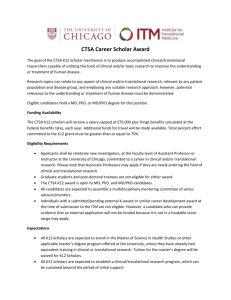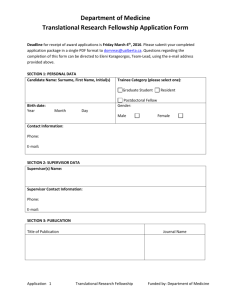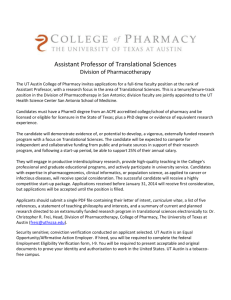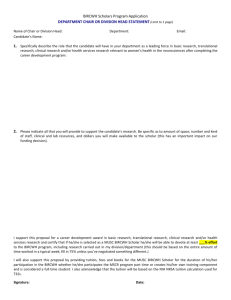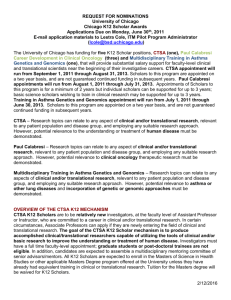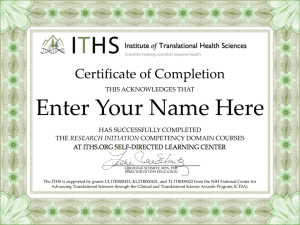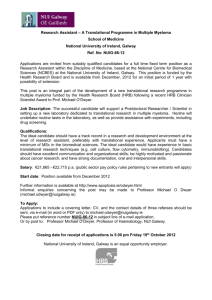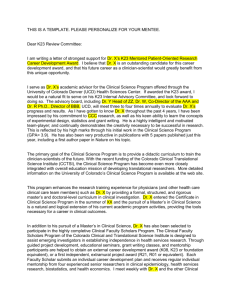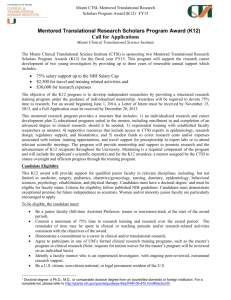The Paul Calabresi Career Development in Clinical Oncology
advertisement
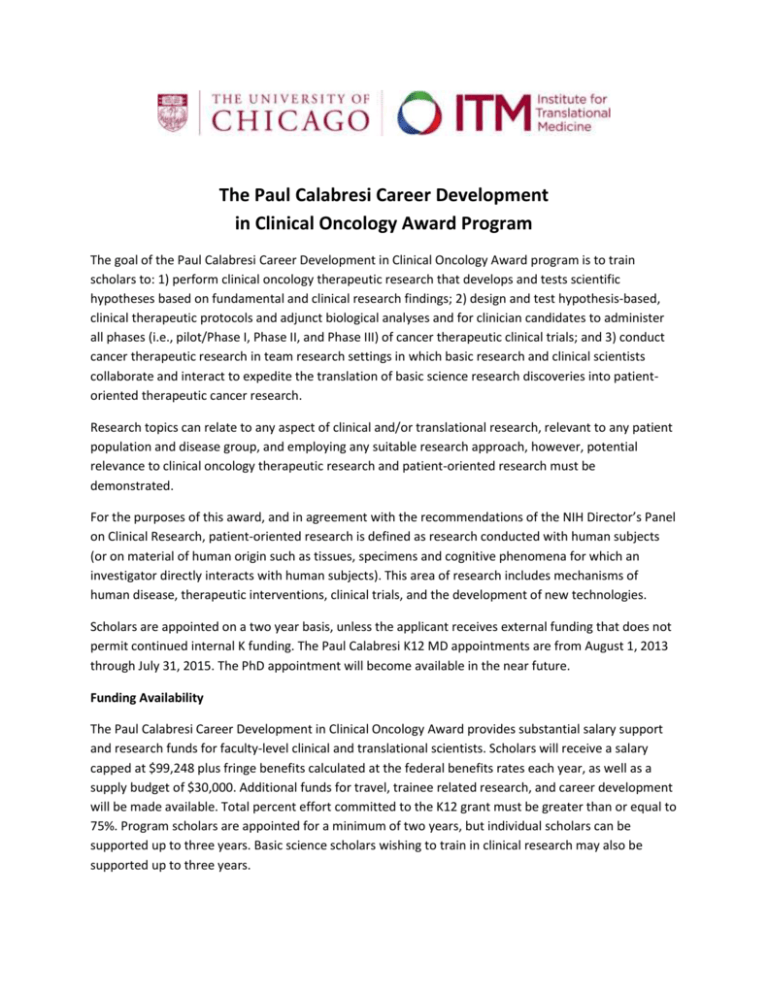
The Paul Calabresi Career Development in Clinical Oncology Award Program The goal of the Paul Calabresi Career Development in Clinical Oncology Award program is to train scholars to: 1) perform clinical oncology therapeutic research that develops and tests scientific hypotheses based on fundamental and clinical research findings; 2) design and test hypothesis-based, clinical therapeutic protocols and adjunct biological analyses and for clinician candidates to administer all phases (i.e., pilot/Phase I, Phase II, and Phase III) of cancer therapeutic clinical trials; and 3) conduct cancer therapeutic research in team research settings in which basic research and clinical scientists collaborate and interact to expedite the translation of basic science research discoveries into patientoriented therapeutic cancer research. Research topics can relate to any aspect of clinical and/or translational research, relevant to any patient population and disease group, and employing any suitable research approach, however, potential relevance to clinical oncology therapeutic research and patient-oriented research must be demonstrated. For the purposes of this award, and in agreement with the recommendations of the NIH Director’s Panel on Clinical Research, patient-oriented research is defined as research conducted with human subjects (or on material of human origin such as tissues, specimens and cognitive phenomena for which an investigator directly interacts with human subjects). This area of research includes mechanisms of human disease, therapeutic interventions, clinical trials, and the development of new technologies. Scholars are appointed on a two year basis, unless the applicant receives external funding that does not permit continued internal K funding. The Paul Calabresi K12 MD appointments are from August 1, 2013 through July 31, 2015. The PhD appointment will become available in the near future. Funding Availability The Paul Calabresi Career Development in Clinical Oncology Award provides substantial salary support and research funds for faculty-level clinical and translational scientists. Scholars will receive a salary capped at $99,248 plus fringe benefits calculated at the federal benefits rates each year, as well as a supply budget of $30,000. Additional funds for travel, trainee related research, and career development will be made available. Total percent effort committed to the K12 grant must be greater than or equal to 75%. Program scholars are appointed for a minimum of two years, but individual scholars can be supported up to three years. Basic science scholars wishing to train in clinical research may also be supported up to three years. Eligibility Applicants shall be relatively new investigators, at the faculty level of Assistant Professor or Instructor at the University of Chicago, committed to a career in clinical and/or translational research. Please note that Associate Professors may apply if they are newly entering the field of clinical and translational research. Graduate students and post-doctoral trainees are not eligible for this award. The Paul Calabresi opportunity is available to MDs only. All candidates are expected to assemble a multidisciplinary mentoring committee of senior advisors/mentors. Individuals with a submitted/pending external K award or similar career development award at the time of submission to the ITM are not eligible. However, a candidate who can provide evidence that an external application will not be funded because it is not in a fundable score range may apply. Expectations All K12 Scholars are expected to enroll in the Master of Science in Health Studies or other applicable master’s degree program offered at the University, unless they have already had equivalent training in clinical or translational research. Tuition for the master’s degree will be waived for K12 Scholars. All K12 Scholars are expected to establish a clinical/translational research program, which can be sustained beyond the period of initial support. All K12 Scholars are expected to participate in the monthly ITM Clinical Scholar Seminar Series, ITM Outcomes Research Workshops and other ITM educational seminars, as appropriate to their areas of study. A crucial expectation of the awardees is that preliminary data will be developed which will serve as the basis for an NIH-level grant application in clinical and/or translational research. Awardees will be expected to submit progress reports on a six month basis or more frequently as requested by the ITM Executive Committee. Reappointment for additional years will be dependent on compliance with the award expectations listed here. Application and Review To apply, please include the following: 1. Full curriculum vitae (not an NIH Biosketch) 2. A one-page description of the candidate’s commitment to an academic career in patient-oriented research, to include all professional responsibilities and their relation to the proposed activities in the career award. 3. A research proposal (limit 7 pages) including: specific aims (1 page) research strategy i. significance ii. innovation iii. approach iv. impact statement preliminary studies literature cited, and information regarding human subjects and vertebrate animal involvement (these elements are not included in the 10-page limit) 4. A brief letter from the Department Chair addressing: the candidate’s prospects for development into an independently funded clinical/translational scientist; the Department’s assurance that at least 75% of the candidate’s time will be protected for research career development and devoted to her/his role as a K12 Scholar; and names of proposed mentors who will constitute a multidisciplinary mentoring committee for the Scholar (a minimum of two disciplines must be represented). Mentors can be from outside the University of Chicago however UC mentors will also be expected. 5. A brief letter from the candidate’s mentors, indicating their commitment to the candidate and support for the training plan. Applications by women, underrepresented minorities, individuals from disadvantaged backgrounds, and individuals with disabilities remain a high priority for funding. The academic and intellectual background, motivation, and commitment of the candidate to pursue clinical and/or translational research will be evaluated. The criteria for selecting awardees will include assessment of the candidate’s potential, the dedication to clinical and/or translational research, and the degree of support from the Department. Applications will be accepted until the positions are filled. Paul Calabresi Clinical Oncology K12 applications should be prepared as a single PDF file, with the filename as Oncology-K12- PIname.pdf (PI name = your name) Please e-mail applications (in a single PDF file) to ITMapplications@bsd.uchicago.edu.
